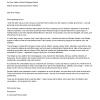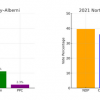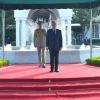Last week, you told professors at the University of Wisconsin that they needed to “work harder.” You were making a case that the Wisconsin state budget crisis could be ameliorated by increasing employee efficiency, and you suggested having faculty teach at least one more class. I’m not going to talk about whether or not the budget crisis is manufactured (some have argued it could be solved by accepting federal funds for the state’s Badger Care health program), or whether your real goal is really partisan politics, and not fiscal responsibility.
Instead, I want to talk about the myth of the lazy professor, a stereotype that you’ve reinforced with your comment. I spent 2005 to 2012 at the University of Wisconsin, where I obtained a PhD in the Department of Geography; I am now an assistant professor at the University of Maine.
When you say we should work harder, I hear two things: 1) we aren’t working hard, and 2) we don’t think we have to. Professors seem like an easy target. We have good job security, we’re paid well, we often come from privileged backgrounds. We appear to have little to do but teach a class for a few hours a week, and we have extended vacations. It’s easy to see us as cloistered in the Ivory Tower, without much experience with the “real world” and the concerns of average folks.
The picture I’ve painted for you is incomplete, though. First, the diversity of faculty has been increasing slowly, to include women, minorities, the working class, and other historically underrepresented groups. We may be paid well, but we’re not paid as well as our counterparts in the nonacademic positions, and getting a PhD comes with many opportunity costs (at 34, I have only just started a retirement fund and saving for a home). For me, as a working class, first-generation college student, a PhD and an academic career was a pathway to the middle class.
A faculty career is much more than a couple of leisurely hours pontificating in the classroom. I put in 50 to 60 hours of work a week at a minimum, and only 6 of those are in the classroom. So what about the rest?
Teaching preparation: It can take hours to prepare each lecture, including research, reading, and preparing slides and notes. Then, there’s grading, office hours to meet with students, and the undergraduate majors I advise. Total, this takes an average of 15 hours a week.
Meetings: I meet with my graduate advisees for an hour each, plus our weekly lab meetings. I have faculty meetings (where we try to decide things like how to run the department with the most undergraduate majors on campus in the face of drastic budget cuts). I have university-level committee work (faculty do a lot of administrative work to help the university function). I’m on a search committee this semester to hire a new professor to replace one who passed away unexpectedly. I attend presentations by visiting scholars and students, and committee meetings for the students I advise. Total, meetings can average 10 hours a week.
Research: I go into the field or the lab when I can but most of my time these days is spent on proposals (which have a 6% success rate, and which bring in money to the university in the form of 46% overhead). Writing papers takes a lot of time: analysis, writing, revision, making figures, submission to a journal, and revision. I try to save at least 10 hours a week for research even in busy weeks, but I don’t always succeed. When I have a grant deadline, this can take 20-60 hours a week.
Service & Outreach: I review papers and grant proposals in my discipline and am an editor for two journals (an unpaid service). I am on the board of an international scientific society. I co-run the department seminar program, where we bring scholars from all over the world to interact with our scientists and fuel collaboration and innovation. I give talks at other universities (typically unpaid), and I am a resource for journalists and general inquiries from the community. I blog and use Twitter. I host school children in my lab and Skype with classrooms and give public lectures. None of this is in my job description, but I do it because communicating my work is important to me, and because as a faculty at a public land grant institution doing publicly funded work, I believe I have a duty to do so. This can take as much as 5-10 hours a week.
All told, this adds to at least 50 to 60 hours a week, on average, year-round. I don’t get summers off. I may not get paid for my work in the summer, but operations don’t cease in my lab or my office. Summer is a time to push forward research, to get into the field and collect new data, and to take advantage of the lack of meetings and classes to get work done. I think my situation is pretty typical, compared with my colleagues’ work loads in the sciences (my friends in the humanities often have much heavier teaching loads, though grant-writing and research expectations may be reduced in contrast).
So, Governor, when you say “work harder,” I want to know if you’re really asking me to add another 15-20 hours to my week? If not, where do I make the cuts? Which of the above can I stop doing without doing a major disservice to my department, my university, my students, or my field? Or, I could do the same amount of work, but put less effort into teaching, and pass those cuts along to the students taking my classes, and the parents investing in their kids’ educations.
When you tell us to “work harder,” you paint a false picture of academic labor and its value. The University of Wisconsin has a rich legacy of teaching, research, and service to the state, the nation, and the world; this is the institution that has made immense advancements in nutrition (including discoveries of vitamins A and B, methods for fortification of milk with vitamin D and iodization that have saved thousands of lives), that pioneered the field of meteorology, made major advancements in the study of what causes and cures cancer, that conducted the nation’s first bone marrow transplant, discovered retroviruses, developed the map projection used by National Geographic, and cultured the first embryonic stem cells.
These innovations came about not by random chance or lone genius, but by work. Hard work.
It doesn’t matter, ultimately, whether the myth of the lazy professor is born of anti-intellectualism, political grandstanding, or ignorance. It belittles the efforts of people working to save lives, develop new technologies, protect our natural resources, create works of beauty for others to enjoy, and understand the forces that have shaped our past and our present. It diminishes our legacy, and promotes policies that will undermine our ability to innovate, adapt, create, and understand our world.
I invite you to consider shadowing a professor for a week. I’m sure there are any number of folks who would be willing to share their labor with you, so that you understand the full extent of what hard work looks like through our eyes. My office door is always open should you find yourself in Maine.
Sincerely,
Dr. Jacquelyn Gill
University of Wisconsin ’08 (MS), ’12 (PhD)
PS I wrote this letter in my “free time.”
Original Source: https://contemplativemammoth.wordpress.com/2015/02/03/an-open-letter-to-...
















